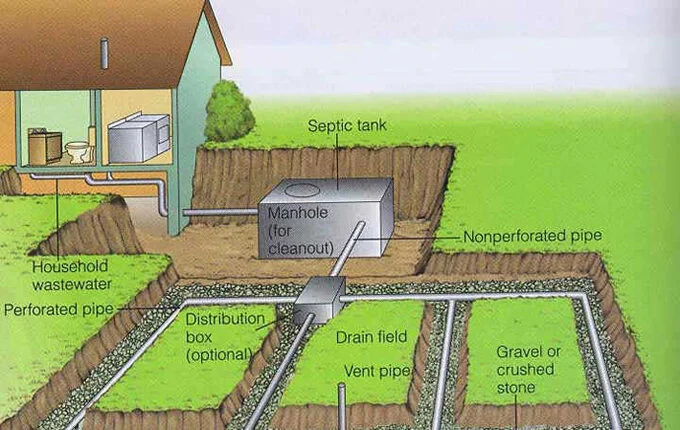
How does a septic system work?
Septic system work by holding waste materials in a tank that allows them to breakdown, the solids fall to the bottom while the liquid flows out the outlet into the field lines.
Septic failures can happen from crushed or clogged pipes
Septic Systems Failures
In the instance of a septic failure, solid materials or sludge blocks all or part of the field lines, outlet or inlet to the tank. Regular cleaning can help alleviate future problems. However, many are faced with aging systems that have cracks, leaks, or breaks in the system; this requires some level of remediation. Without remediation, sewage can leak into nearby waterways (eventually the Tennessee River, our local water resource) and cause infectious disease.
Is your Septic System Failing?
Here are a few signs that your system may be failing:
Drains are slow to drain or clog often (note: drain cleaning products can damage your septic system’s natural bacteria)
Toilets back up, flush slowly, or do not flush properly
Grass or landscaping appears more lush than usual in certain spots in your yard (may be more noticeable in the warmer summer months)
Soggy soil, grass, or landscaping
Stinky areas of your yard or landscaping
Water Quality
Ensuring your septic system is functioning optimally will ensure the water near your home is clean and free of sewage born illnesses. This will also help keep our waterways clean and fresh for our enjoyment as well as the ensuring the native wildlife has a healthy habitat.
Sewage in our water ways can lead to an increase in bacteria which damages the habitat for many native species. The increased bacteria can reduce available oxygen in the water, increase nitrogen, increase water temperatures, and promote the overgrowth of algae which blocks sunlight for water plants and destroys habitat for many fish.
Types of Septic Systems
Conventional System: this is the most typical system in our area. This type of system is pictured above with a holding tank and a series of pipes that release liquid over the disbursement area. There are a few different types of tanks and pipes that can be installed - we prefer using Infiltrator Systems as we have found that it allows for the best water disbursement. Infiltrator systems also allow us to use less ground area for your field lines.
Low Pressure Pipe (LPP): this type of system is required for certain areas based on the soil available. In this system a series of shallow trenches with perforated pipe is laid and liquid waste is dosed throughout the system.
Boruff Septic & Excavation is licensed for septic installation and repair in Tennessee. The team is insured to install and remediate septic issues.

